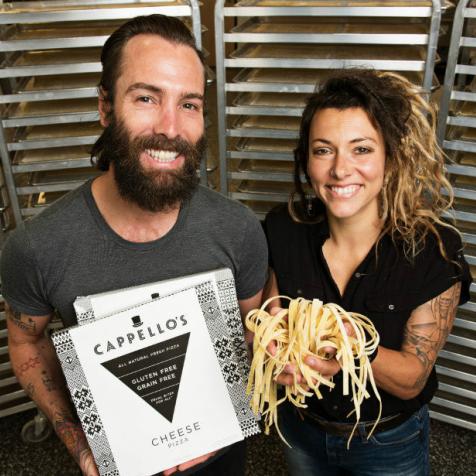
Company Details
Location
Denver, Colorado
Founded
2011
Ownership Type
Private
Employees
20
Products
Gluten-free frozen foods
Denver
Founded: 2011
Privately owned
Employees: 20
Industry: Food & Beverage
Products: Gluten-free frozen foods
Co-founders Stacey Marcellus and Ben Frohlichstein are melding cutting-edge and traditional food manufacturing as their gluten-free pastas and pizzas catch on nationwide.
After discovering she was gluten-intolerant herself, Marcellus found a kindred entrepreneurial spirit in Frohlichstein. "He wanted to start a brand, and specifically a pasta brand," she says. "We decided [gluten-free] was a smart industry to get into."
They took their recipes a step further by going completely grain-free. "Our products don't have any corn or rice or quinoa in them, and that really differentiates us," says Marcellus. While corn and rice don't contain gluten, they are "high on the glycemic index," she explains. "It really messes with your blood sugar."

She points to 1977 as the onset of the obesity epidemic in the U.S. -- when the low-fat craze led to the food industry replacing fats with sugars. To this end, the company uses almond flour as the primary ingredient in its gnocchi, fettucine, and lasagna sheets. It perfected its unique recipes at its original kitchen in Arvada.
A new line of pizzas that debuted in 2015, using cage-free eggs, arrowroot flour, and coconut oil in the crust. New for 2017: a pepperoni pizza, "which is a really big deal for our company," says Marcellus. "It'll probably be our bestseller."
She adds, "The Paleo community likes to seek out nicely sourced meats. "The pepperoni is premium quality and coming from humanely raised cows and pigs."

The pepperoni joins sheep's milk and build-your-own, "naked crust" pizzas the Cappello's catalog. "As far as we know, we're still the only sheep's milk pizza in the United States," says Frohlichstein.
After launching chocolate chip in 2013, Cappello's selection of cookie dough grew to include three new flavors in 2016: gingersnap, lemon zest, and double chocolate.
Catalog-wide, the key innovation -- and the company's trade secret -- has been the tweaking of recipes to go grain-free. "Because we use unique ingredients, we had to get over some pitfalls," says Marcellus. "The way we use things is a little bit different."
Beyond the gluten-intolerant market, Cappello's has ridden a pair of trends to a broader market. "One ot the markets we're capturing is the Paleolithic diet market," says Frohlichstein. "People are returning to their hunter-gatherer roots when there weren't any farmed grains. That's really popular with the CrossFit community."

They hit it off with some top names in the Paleo world right off the bat, who promoted the fledgling products in the burgeoning community. Likewise, Cappello's has leveraged both social media (with more than 85,000 Facebook likes and 48,000 Instagram followers) in its marketing, as well as paid advertising in CrossFit and Paleo magazines. "Two in-house marketers are trying to make sure the products we put out into the world are known about," says Frohlichstein.
The social-media presence helped the company launch with a solid mail-order business and a food-services operation, but it's since seen retail overtake other channels. As of mid-2014, Cappello's was available in about 250 stores in 20 states; three years later, the brand is in 1,400 stores in all 50 states, including Whole Foods, Natural Grocers, and numerous regional chains.
"We've doubled if not more than doubled every year," says Frohlichstein. Revenue is poised to hit "several million" dollars in 2017. Future growth is about "making sure those stores carry as many products as possible," he adds. "The merchandising efforts are becoming more paramount for the brand."

To keep up with demand, the company moved into a new kitchen in 2016. Also in Arvada, the new 8,000-square-foot space built out by Cappello's landlord "is a beautiful, top-notch facility," says Frohlichstein. "It is as sophisticated as it could get for the products we're manufacturing."
Marcellus says upgraded equipment, some of it automated, has brought more consistency and longer shelf lives to Cappello's offerings. She points to in-house innovations on a "gnocchi extruder, and adds, "We tend to use traditional machinery in an untraditional way. There's still this large human component to it that a machine can't mimic. . . . It's still a very handmade process."
A staff of 12 longtime employees work in production. "We feel very blessed to have the same 12 employees we've had the whole time," says Frohlichstein. "It's about the people working at Cappello's. That's our most valuable asset."

Challenges: Educating the market, says Marcellus. "We're not willing to compromise on any of our ingredients, so price will always be a factor," she explains. "As we grow, our prices will come down over time."
It's not all about price, Marcellus adds. "Educating the public to go to the frozen food aisle for our product is a big deal. Frozen pasta, not dry pasta, is something people aren't used to."
Freight logistics have proven difficult to perfect, adds Frohlichstein. "It's both a challenge and something we're excited about -- but it is a challenge," he says. We're looking to implement a hub-and-spoke model."
Opportunities: Frohlichstein points to food services like campuses, hotel chains, and restaurants. In 2016, such accounts accounted for about 10 percent of the company's sales. "I'd like to see that quadruple," he says. "It's really kind of endless on the food-service side."
Needs: Capital. While an angel investor funded the company in 2014, "Staying well-capitalized is something we're always going to be concerned about," says Frohlichstein.
